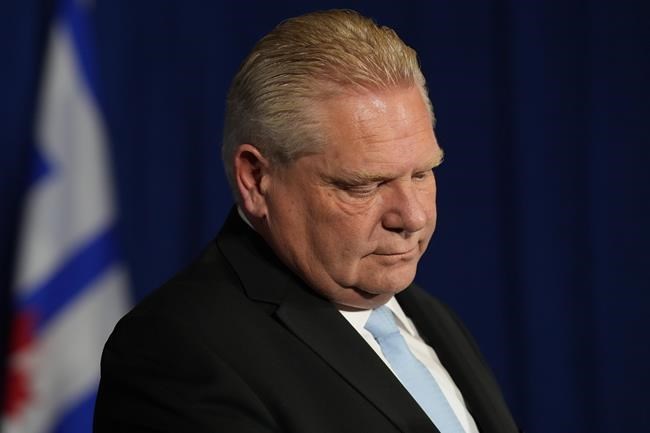TORONTO — Ontario Premier Doug Ford's government announced plans Wednesday to reverse an earlier move to dissolve the upper-tier municipality of Peel Region, which would have left Mississauga, Brampton and Caledon standing on their own. It is the latest in a long series of policy backtracks for Ford. Here is a partial list of those reversals:
Dissolution of Peel: Municipal Affairs and Housing Minister Paul Calandra announced he will introduce legislation to undo a law the government passed in June to dissolve the region in 2025. As part of the same announcement, Calandra said he is revoking some Minister's Zoning Orders and cancelling municipal audits – with the first phase already largely complete – that were started to determine the financial impacts of a provincial law on city coffers.
Official plans: Earlier this fall, Calandra reversed course on changes to some municipal official plans and urban and regional boundary expansions. Many regions and municipalities had spoken out over the changes, saying the extra land wasn't needed to build more housing.
Greenbelt: The largest of the government's policy reversals this year was a backtrack of its decision to open up parcels of the protected Greenbelt lands for housing development. Ford apologized for removing the lands in the first place, after both the auditor general and integrity commissioner found the process unfairly favoured certain developers. The RCMP is now investigating. Ford's government passed a law earlier this month to cement his reversal and enshrine Greenbelt protections in law.
Notwithstanding clause: The government passed then later repealed a law in 2022 that imposed a contract on education workers and banned them from striking, using the notwithstanding clause to guard against constitutional challenges. The province passed the law in a bid to prevent 55,000 school support workers from the Canadian Union of Public Employees from striking, but they walked off the job anyway and Ford offered to withdraw the legislation if they returned to work.
Licence plates: Ford introduced new, blue licence plates as part of the 2019 budget, but the government quickly scrapped the rollout after a police officer in Kingston noted the plates were barely visible at night. The government is no longer issuing those plates, but as of last year there were still 170,000 in circulation and the province has not yet articulated a plan to get them off the roads.
Autism: In February of 2019, the government announced a revamp of the Ontario Autism Program. It was framed as a way to clear a massive waiting list for services, but would have given families a relatively small amount of money based on their income, not the needs of their child. It also would have effectively cut off thousands of kids currently in government-funded therapy. After a loud and sustained outcry, the government announced a reversal, saying it was going back to the drawing board on a needs-based program and would double the current budget. That new program is still subject to many issues in 2023.
Public health: Mayors across the province banded together to fight retroactive cuts to public health funding in 2019, and the government ultimately relented. The cuts, in the form of a new cost-sharing arrangement, were to mostly go ahead in 2020, but mid-year cuts that would have taken effect after municipalities had already passed their budgets were cancelled. The cuts were paused due to the onset of the pandemic and it wasn't until 2023 that the government permanently reversed them.
E-learning and class sizes: The government angered teachers in the spring of 2019 when it announced it was increasing average high school class sizes from 22 to 28, and mandating that students take four online courses to graduate. In the context of difficult negotiations with the education unions, the education minister offered to walk that class size target back to 25, and announced that students would instead be required to take two online courses to graduate.
French university: As part of the government’s efforts to balance the books, it announced in 2018 that it was cancelling plans for a French-language university. The move sparked an outcry among Franco-Ontarians and prompted a Progressive Conservative caucus member to quit. Ontario and the federal government later announced they had reached an agreement on jointly funding a French-language university.
Legal aid: The 2019 provincial budget cut that year’s funding for Legal Aid Ontario by $133 million – or 30 per cent – and planned $31 million in further cuts over the next two years. Eight months later, the government announced it was cancelling those future cuts.
This report by The Canadian Press was first published Dec. 13, 2023.
The Canadian Press

